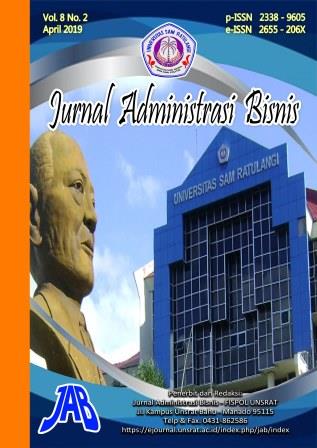Analisis Perbandingan Kinerja Berdasarkan Kesetaraan Gender Pada PT. Astra International, Tbk. – Daihatsu Sentra Manado (Studi Pada Karyawan Bagian Marketing)
DOI:
https://doi.org/10.35797/jab.v8.i2.60-66Keywords:
Employee Performance, Gender EqualityAbstract
This study aims to see whether there are significant differences in performance based on gender equality in female employees and male employees in the marketing division of PT. Astra International, Tbk. - Daihatsu Sentra Manado. The population of this study is all employees of the marketing division of PT. Astra International, Tbk. - Daihatsu Sentra Manado, which consists of 51 employees, consisting of 36 male employees and 15 female employees. The sampling technique used is the census technique, which is to take from all existing populations to be sampled. Where there were 15 female employees and 15 male employees were taken to balance the sample of female employees. So the total sample in this study was 30 employees. Based on the results of descriptive statistical analysis, the average value for the performance of male and female employees is equally higher than the minimum value available. Although not large, the results of this study indicate that the average value of male employee performance is higher than that of overall female employees. From the results of the independent sample t-test statistical test, a significant value gives a result stating that H0 is accepted. The results of this study state that there is no significant difference in performance between male employees and female employees in the marketing department based on gender equality.References
-----------. Kamus Besar Bahasa Indonesia. [Online]. Tersedia di https://kbbi.web.id/karyawan. Diakses Selasa, 5 Maret 2019. Pukul 09.48
Bernardin , H. and Russel. 2010. Human Resource Management. New York: McGraw-Hill.
Dwidjowijoto, N. 2007. Manajemen Pemberdayaan: Sebuah Pengantar dan Panduan untuk Pemberdayaan Masyarakat. Jakarta: PT Elex Media Komputindo.
Effendi, S. N. 2018. Kinerja Pegawai Berdasarkan Kesetaraan Gender Di Kantor Kecamatan Batu Sopang Kabupaten Paser. Jurnal Pemerintah Integratif 6, (1): 95-104. http://ejournal.pin.or.id
Hasibuan, M. 2012. Manajemen Sumber Daya Manusia. Jakarta: PT Bumi Aksara.
Mangkunegara, A. P. 2012. Manajemen Sumber Daya Manusia. Bandung: PT. Remaja Rosdakarya.
Pio, R. J.. 2015. Kepemimpinan Spiritual (Dimensi-Dimensi Sumber Daya Manusia). Yogyakarta: Kepel Press.
Puspitawati, H. (2013). Konsep, Teori Dan Analisis Gender. Institut Pertanian Bogor, Bogor.
Shaleh, M. 2018. Komitmen Organisasi Terhadap Kinerja Pegawai. Makassar: Aksara Timur.
UU RI No.13 Tahun 2003 tentang Ketenagakerjaan.
Wirawan. (2009). Evaluasi Kinerja Sumber Daya Manusia Teori Aplikasi dan Penelitian. Jakarta. Penerbit: Salemba Empat.



